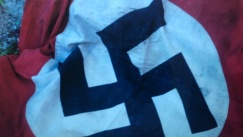The gatehouse at Auschwitz/Birkenau Many congratulations to Carol Hitchcock of Bedfordshire who was the first person chosen at random from the subscribers to WW2History.com who got the correct answer to the competition for June. This question proved to be the hardest yet set: The camp at Auschwitz/Birkenau was not originally intended to hold large numbers […]
WW2 Anniversary
| 29 June 2011The advantage of arbitrary terror
Soldiers of the Red Army were surrendering in droves. Today is the 70th anniversary of one of the most dramatic meetings of the Twentieth Century. Joseph Stalin arrived at Soviet Military headquarters on Frunze street in Moscow and confronted his generals about the desperate military situation – just one week after the Germans had launched […]
WW2 Anniversary
| 22 June 2011The biggest invasion in history
Six weeks to get to Moscow? Today is the 70th anniversary of the largest invasion in the history of the world. Just before dawn on 22 June 1941 over three million German soldiers and their allies pushed forward in three massive thrusts into the Soviet Union. Army Group North, commanded by Field Marshal Leeb, headed […]
WW2History.com News
| 9 June 2011Auschwitz – a complicated history
There was more than one Auschwitz camp. This month’s competition question for WW2History.com subscribers is proving very interesting. Not because lots of people have got the answer correct so far but because of the reverse – no one who has entered the competition has got the correct answer yet. This is the question: The camp […]
WW2 Competitions
| 1 June 2011Competition winner – May
Fighting through Normandy Congratulations to Jodie Neville of the West Midlands who wins the competition for May. Hers was the first name taken at random from all of those WW2History.com subscribers who gave the correct answer to the question: Immediately after landing on the Normandy beaches the Allies had to fight their way through countryside […]
WW2 People
| 28 May 2011‘I wish I had died in the war’
The Blitz – a time of death and glory for Britain In the spring of 1986 I was driving through the Loire valley, listening to an interview on Radio 4 with Enoch Powell, one of the most famous British politicians of the time. It was all predictable stuff until Powell was asked how he would […]
WW2 People
| 21 May 2011Sympathy for the Devil
Is it legitimate to express ‘sympathy’ for Adolf Hitler? This week the Danish film director Lars von Trier was banned from the Cannes film festival for confessing – tongue in cheek, one suspects – that he was a ‘Nazi’ and that he had ‘sympathy’ for Adolf Hitler. Von Trier craves attention and loves to shock […]
WW2 Relevance
| 6 May 2011Bin Laden, Hitler and Munich
The site for the new document centre, next to the building that housed Hitler’s office in Munich. Hitler and Bin Laden, both mass murderers whilst alive, now have something in common whilst dead – nobody knows precisely where their bodies are. Bin Laden’s remains were chucked by the Americans into the ocean and Hitler’s charred […]
WW2 Competitions
| 1 May 2011April competition result
Charles De Gaulle Congratulations to Mr George Cox of Devon, who has won April’s WW2History.com competition, as he was the first subscriber selected from those who correctly answered last month’s question. The question was: De Gaulle was famous for his cryptic remarks. One of his strangest was when he was asked his reaction to the […]
WW2 Relevance
| 26 April 2011Where does courage come from?
The steppes near Stalingrad where Vladimir Kantovski fought. I recently learnt that a close friend of mine has cancer. And instead of falling to pieces – like I fear I perhaps might at such news – he is brave and stoical. Why? Where does such courage come from? I could never have predicted that he […]
 Twitter
Twitter





